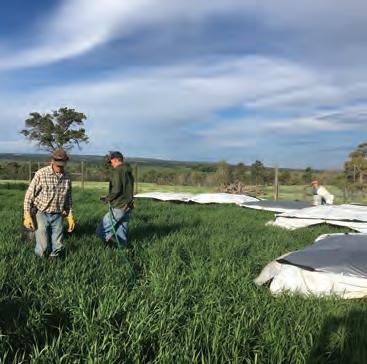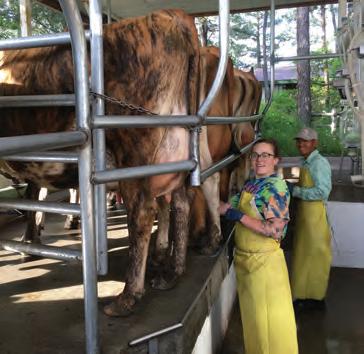
3 minute read
DISPATCH FROM THE JAMES RANCH by Tarryn Dixon
onto the farm, except to pick up food. We require them to practice social-distancing measures and wear a face mask. We take good care when we’re out in the community to protect ourselves from the virus. Our Quivira apprentices quarantined themselves here on the farm for 14 days before starting their work.
To be resilient — with or without a pandemic — we must eat nourishing foods, sleep well, live stress-free (right!), balance vocational and avocational pursuits, and exercise regularly. But we must also concern ourselves with the health of our customers, who are drawn to our food as medicine in hopes of keeping their immune systems strong. During these uncertain times, our customers are also increasingly seeking out local food sources to maximize their overall food security. Of course, our extended communities must remain strong to provide us with the supporting services we need to thrive: feed stores, hardware stores, groceries, banks, post offices, laundromats, accountants, lawyers, government agencies, car repair, etc. This point ties right into the economic leg of the three-legged stool. Without these services, our jobs as farmers are made all the more challenging. The other side of that same coin is that many of these services wouldn’t exist in rural America if it wasn’t for demand from the agricultural sector. Moreover, for a farm to be resilient, it must also be profitable. Unfortunately, profit margins for small farms during a pandemic can be squeezed, as workers are more difficult to find, business plans pivot away from what was previously considered the “norm,” and supply chain disruptions increase costs. Diverse farm enterprises are smart and, of course, seductive, but they won’t be resilient unless they more than pay the bills. There is no question that more challenges lie ahead. Drought, floods, severe storms, climate change, loss of biodiversity, our exploding human population. We can treat the pandemic as a global test-run of our preparedness in addressing these challenges. It’s incumbent on us to chronicle this unprecedented pandemic episode by documenting our pertinent observations, our unique difficulties, and the powerful lessons we are all learning so that future generations can avoid our mistakes. That will be the true test of resiliency. Are we ready?
Advertisement
diSpatch frOm the JameS ranch by Tarryn Dixon
Dairy farming seasonally at the James Ranch in Durango, Colorado, has taught me more patience than any other part of my life. Working with animals, waiting three months for wheels of cheese to age before you can even taste what you’ve made, fixing fence after you snag it with a tractor fork — many aspects of this work take patience. Life in the age of COVID-19 has created a need for patience in all of us. Coping with hard decisions about social distancing with the people you love, feeling like the whole town has run out of toilet paper (just when you are on the last roll at home), and learning to navigate the new sense of fear for the future, all take patience. Many of my friends work in the hospitality industry; others are chefs and bartenders, bakers and hair stylists, ski resort and hotel employees. Many of them have found themselves out of work, joining the millions of other Americans filing for unemployment benefits. Meanwhile, calving season has started up at the ranch, and I find myself feeling blessed to have a job. I am lucky to have found fulfilling work that I am consistently passionate about, but the last few months have been a real eye-opener. In a time when my friends are losing jobs, and many dairies are losing business due to school and restaurant closures, we are working away, getting into the swing of things for the season. Cows are calving, milk is flowing, and the pastures are growing. Our community is still sending business our way, and we plan to make more wheels of cheese this year than last. So, while my friends wait to see when — and if — they will have a job in the coming months, and while other dairies dump unsold milk down floor drains, I will be doing everything I can to show my gratefulness for a job. I will remind myself that I have been blessed in a very rough time. I will be patient waiting for cheese to age and for the world to return to normal for us all.












